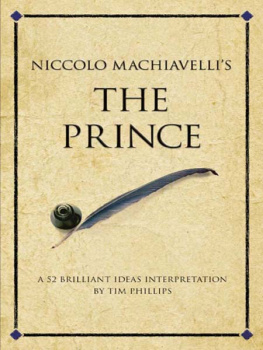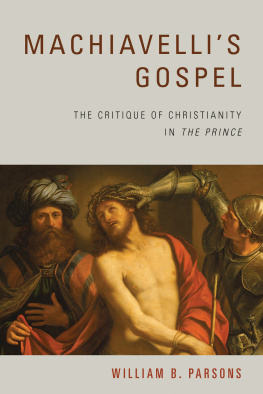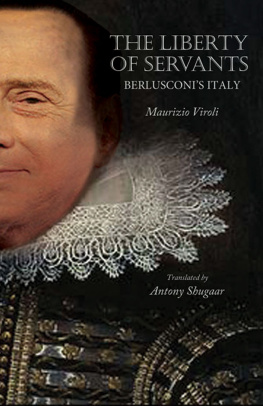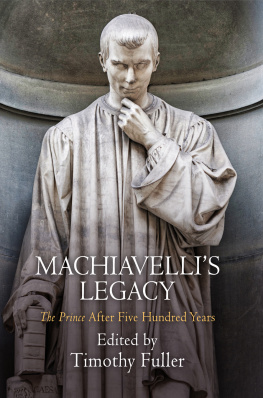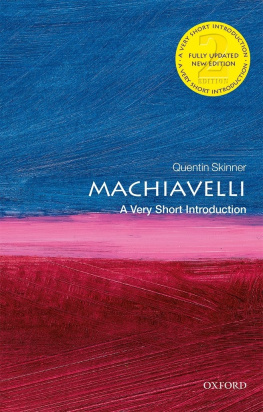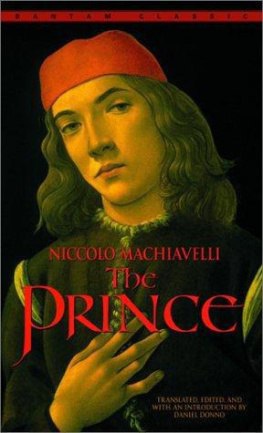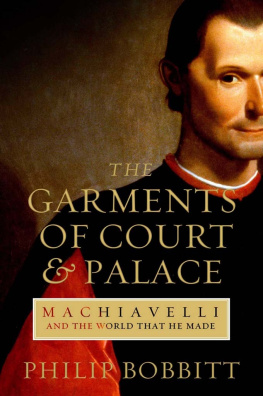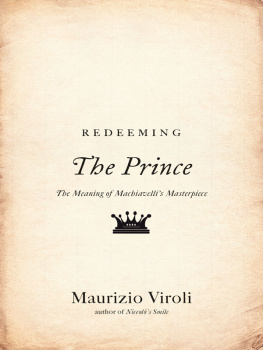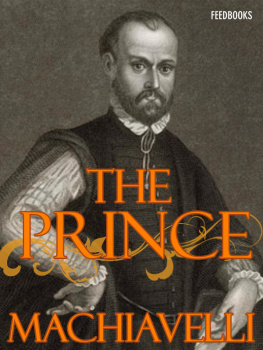
Redeeming The Prince


Redeeming The Prince

THE MEANING OF MACHIAVELLIS MASTERPIECE
Maurizio Viroli
PRINCETON UNIVERSITY PRESS
Princeton & Oxford
Copyright 2014 by Princeton University Press
Published by Princeton University Press, 41 William Street, Princeton, New Jersey 08540
In the United Kingdom: Princeton University Press, 6 Oxford Street, Woodstock, Oxfordshire OX20 1TW
press.princeton.edu
FRONTISPIECE: Title page of Machiavellis Il Principe, 1532.
Rare Books Division, Department of Rare Books and Special Collection, Princeton University Library.
Photo: Princeton University Library.
All Rights Reserved
Library of Congress Cataloging-in-Publication Data
Viroli, Maurizio.
Redeeming The prince : the meaning of Machiavellis masterpiece / Maurizio Viroli.
pages cm
Includes bibliographical references and index.
ISBN 978-0-691-16001-6 (hardcover : alk. paper) 1. Machiavelli, Niccol, 14691527. Principe. 2. POLITICAL SCIENCE / History & Theory. 3. HISTORY / Europe / Italy. 4. HISTORY / Modern / 16th Century. 5. PHILOSOPHY / Political. I. Title.
JC143.M3946 V47 2013 2013017926
British Library Cataloging-in-Publication Data is available
This book has been composed in Adobe Caslon Pro
Printed on acid-free paper.
Printed in the United States of America
1 3 5 7 9 10 8 6 4 2
Every day I discover you to be a greater prophet than the Hebrews or any other nation ever had.
FILIPPO CASAVECCHIA TO NICCOL MACHIAVELLI IN PISA OR FLORENCE, JUNE 17, 1509
Even as I am writing these words the bells are ringing far and wide, unceasingly, telling that the Italians are in Rome: the temporal power is falling, the people are shouting, Long live the unity of Italy! Let there be glory to Machiavelli!
FRANCESCO DE SANCTIS, ROME, SEPTEMBER 20, 1870
CONTENTS




FIGURES
PREFACE
This book originates from a suggestion by Robert Tempio, senior editor at Princeton University Press. It was he who encouraged me to write an essay to elucidateon the occasion of the 500-year anniversary of its compositionthe meaning and value of Machiavellis Prince. I thank him for having persuaded me to embark on a new project. After having worked for some time on Machiavellis republican ideas, to focus on his allegedly princely text has been a fascinating intellectual experience that has led me to assert, as the reader will see, that in fact there is no difference at all between Machiavelli the republican political writer and Machiavelli the advisor of princes.
I have occasionally used here materials that I had previously published in Machiavellis God (2010). The subject and the argument of the two essays are different. I was focusing there on Machiavellis ideas about God and religion and on their impact on the scholars and the political militants who wrote on the issue of a religious and moral reformation in Italy; here I discuss the intended meaning of Machiavellis Prince and the influence, over the centuries, of his myth of the redeemer and of his ideas on political redemption. Yet, a number of sources and references in Machiavellis God seemed to me necessary and irreplaceable to properly clarify and sustain my argument in Redeeming The Prince.
In this work I have tried to apply a methodological perspective that I had already outlined in another previous work of mine: As if God Existed: Religion and Liberty in the History of Italy (2012). I am referring to the idea of examining an authors political writings in connection with the study of his life, in particular his passions, beliefs, and commitments. In the case of Machiavellis Prince, this approach has allowed me to suggest a number of hypotheses concerning the date of composition of the final chapter, the Exhortation to liberate Italy from the Barbarians, and the meaning of The Prince. Readers will judge if my views are convincing, and the method wise. I intend, in future works, to better elucidate and apply the new, or rediscovered, method that I would tentatively call Ideas and Lives.
My sincere gratitude goes to the colleagues and friends who have discussed with me the argument of this essay, in particular George Kateb and Jean-Jacques Marchand. I have also learned a lot from Quentin Skinner and the other participants in the workshop on The Meaning of The Prince (February 79, 2013) that I have organized with Anthony Grafton under the auspices of The University Centre for Human Values, the Departments of History and Politics, and The Council on Humanities. My thanks go to all these institutions and their directors and chairs. I also wish to express my appreciation to Robert P. George and Bradford Wilson for having organized, under the auspices of the James Madison Programs, a debate with Harvey C. Mansfield in Princeton (December 9, 2012) that has greatly helped me refine my ideas on The Prince.
This book will appear a few months after I have become Professor of Politics, Emeritus, at Princeton University. The transition to the emeritus status marks the end of my career as an active professor at Princeton University. In all candour, with no rhetorical embellishment or exaggeration, I wish to assert here that I owe Princeton University the most important intellectual, moral, and personal experience of my entire life. It is a great consolation for me, and an honor, to know that I will carry the title of Professor Emeritus at Princeton University until the end of my days. As I am now serving at the University of Italian Switzerland in Lugano and am about to begin a new chapter at the University of Texas at Austin, I fondly remember the many years that I have spent at Princeton. I arrived in the USA after a rather impressive list of professional humiliations and defeats in the Italian academic world, and I have found in my new country nothing but rewards, respect, and honors. It is with deep conviction that I want to express here my gratitude to the persons that made it all possible, from my arrival at Princeton in 1987. Among them I wish to single out Anna Elisabetta Galeotti and her late husband Franco Ferraresi, Amy Gutmann, George Kateb, Alan Ryan, Ezra Suleiman, Michael Walzer, Diane and William Price, Paul Sigmund, and other friends who are no longer with us, like Stanley Kelley, Walter Murphy, Clifford Geertz, Albert O. Hirschman. A very special thank-you goes to the brigade (to use a word dear to Machiavelli) of political theorists now serving at Princeton, to Leslie E. Gerwin and to the other colleagues who have helped me in the transition to the emeritus status. This difficult passage in my life would have been painful without the love and the support of my wife Maria Gabriella Argnani and my daughters Giulia and Simona. I dedicate this book to all the people who have contributed to make it possible for a young (many years ago) scholar with no hopes, born poor in a peripheral street in a small Italian town, to become a professor in one of the most distinguished universities in the world.
Next page

